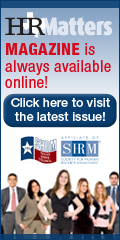
| Archives/Subscribe | Advertise | HR Matters | www.texasshrm.org |
Employment Law Changes from 83rd Legislature Texas lawmakers passed numerous bills affecting employers at the close of the 83rd legislative session, many of which were signed into law. An exception was House Bill (HB) 950, which sought to make it easier for employees to show pay discrimination. Gov. Rick Perry vetoed the bill on the grounds that it "duplicates federal law, which already allows employees who feel they have been discriminated against through compensation to file a claim with the U.S. Equal Employment Opportunity Commission." He added, "Texas’ commitment to smart regulations and fair courts is a large part of why we continue to lead the nation in job creation."
Earning the governor’s signature were numerous bills concerning unemployment compensation (UC), including Senate Bill (SB) 21, which authorizes drug screenings for those receiving unemployment benefits who work in fields where drug testing is mandatory for employment. "Recipients of unemployment benefits have a responsibility to be prepared to work when an opportunity presents itself," Perry said. "Our system is designed to provide assistance to people through a difficult time in their lives, not subsidize those who would misuse the system to live a drug-abusing lifestyle. This bill protects the resources that should be reserved for those truly in need." The bill took effect Sept. 1.
In addition, the governor signed SB 920, effective immediately, which requires that an individual be actively seeking work to be eligible for UC benefits. Also approved were SB 658, which imposes a 15 percent penalty on a person who fraudulently obtains unemployment benefits, effective Oct. 1, and HB 2035, which updates the Texas Shared Work program to meet federal requirements. Numerous bills adjusting unemployment chargebacks were also signed into law at the close of the session.
Legislation to discourage worker misclassification was signed into law as HB 2015, which requires contractors and subcontractors receiving public works contracts to ensure that all workers performing services under the contract are properly classified. An employer that misclassifies workers is subject to a $200 fine for each misclassified worker, effective Jan. 1, 2014. The bill defines "employment" according to the definition provided under Section 201 of the Texas Labor Code.
Finally, HB 1188 was enacted to limit employer liability for negligent hiring. Effective June 14, the law prevents lawsuits against employers "solely for negligently hiring or failing to adequately supervise an employee ... based on evidence that the employee has been convicted of an offense." Such lawsuits are permitted under HB 1188 only if the employer "knew or should have known of the conviction" and if the employee was convicted of (1) an offense that was committed while performing duties substantially similar to those reasonably expected to be performed in the employment, (2) a sexually violent offense, or (3) an offense facilitated by use of controlled substances. The law excludes certain crimes involving property of third parties.
|
|
P.O. Box 8058
Tyler, Texas 75711
www.texasshrm.org • info@texassshrm.org • 214-354-8740




